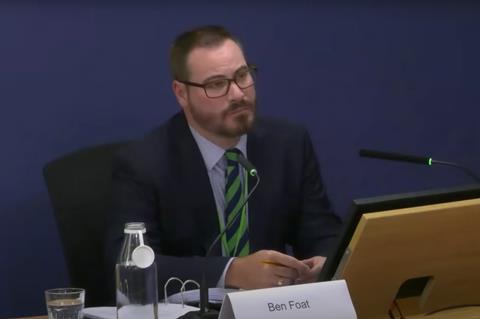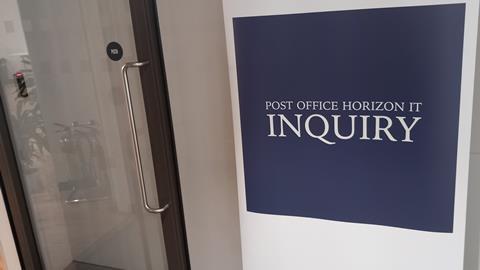Follow our live blog from the Post Office Inquiry
12.45pm: And that is that for the day. We started early due to Sir Wyn Williams having another commitment this afternoon, and he thanks everyone for their cooperation. If you wanted to read Foat's extensive written evidence then you can do so here: All Evidence | Post Office Horizon IT Inquiry.
Otherwise, the inquiry reopens in two weeks and this author will treat himself to a Pret lunch. Thanks for following the blog.
12.35pm: Sam Stein KC now asking the questions. He brings up an email from the European director of Horizon operator Fujitsu, sent to the Post Office chief executive in May this year.
Fujitsu says that it seems the Post Office may be continuing to pursue postmasters for shortfalls in their accounts using Horizon data. It goes on: ‘We would have expected that the Post Office has changed its behaviour in light of the criticisms and is appropriately circumspect with respect to any enforcement actions. It should not be relying on Horizon data as the basis for such shortfall enforcement.’
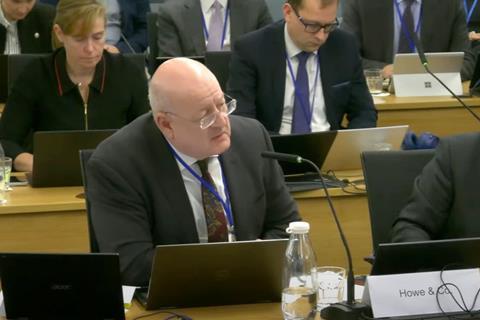
12.15pm: Blake hands over to the lawyers representing core participants. Ed Henry KC, representing a group of sub-postmasters, wants to press Foat on the hurdles placed in front of those seeking compensation.
He cites his client Janet Skinner, a postmistress from Hull who was wrongly convicted and jailed in 2007, who has been required to obtain five different medical reports to prove her current medical condition is linked to her treatment at the hands of the Post Office. Henry says this suggests an 'exacting standard' being advanced by the Post Office for victims to get compensation.
Foat says he cannot comment on individual cases, but suggests that five expert reports 'seems a lot'.
Henry asks whether Foat accepts that the Post Office should act with the utmost good faith in negotiations and not transgress into 'sharp practice'. Foat agrees it should.
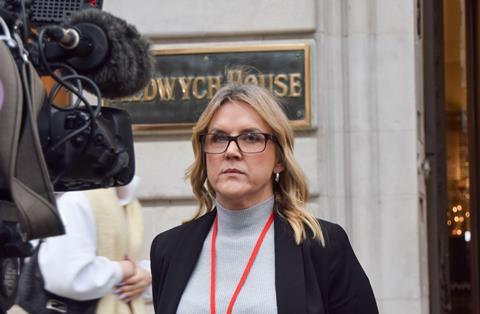
12.05pm: Blake finishes by asking what reflections Foat now has. He says it has been a 'challenging role' to be the general counsel during this period and says he has sought to 'make sure that people understand that legal conformance is a licence to trade'.
Foat continues: 'It is not optionality, it is mandatory, and making sure that the business understands at all levels that complying with the law is essential to good business practice.'
12pm: Attention turns to this memo (see below) written to himself by former Post Office chair Henry Staunton. This states that postmasters being investigated by the organisation last year are 'fed up with the amount of power wielded by Foat' and that he and other senior members still believe postmasters are 'guilty until proved innocent'.
Foat wants to fight this assertion. He tells the inquiry: 'I have maintained throughout my entire tenure at the Post Office that we need to adhere to the Common Issues judgment and Hamilton judgment that [concluded] people are innocent until proved guilty. One need not be a senior lawyer to know that and I am on record saying due process needs to be done.'
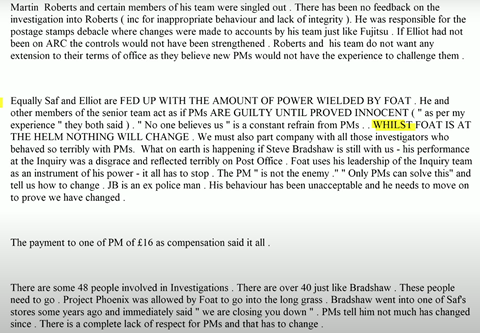
11.55am: Blake asks whether the compensation process is too confrontational. Foat denies this is the case, saying it was a 'well-intentioned scheme' which was based on feedback from postmasters. But he acknowledges that the process could have been handled better.
11.50am: After what was a fairly subdued opening, we're really getting into the meat here.
The inquiry quickly moves onto the involvement of Rodric Williams in the compensation schemes, despite having been heavily involved in the group litigation and the tactics that went with them. Foat says the issue of Williams being involved with assessing compensation was discussed but there were sufficient safeguards on his work.
'This was a very complex, long-standing matter that had been running for years and trying to get up to speed with everything, trying to understand where the documents are and trying to get across the huge breadth of issues in detail was very difficult.
'When Rod was working on these matters he was heavily overseen by external lawyers and indeed the function of HSF was overseeing the litigation that brought the counter-balance.'
11.40am: Now the inquiry looks at discussions about making claimants to the Horizon compensation scheme pay a fee, or placing hurdles in their way making it difficult to make claims. Foat denies it was ever the plan to make it more challenging for applicants.
'In reality that is not the case, if you read the eligibility scheme,' he says. 'Eligibility just required that you were a postmaster, you say you have shortfalls and your shortfalls arose from [Horizon].'
He says there was no hurdle or challenge to apply to the Horizon Shortfall Scheme.
Blake points out that critics report the original forms were overly complicated, and Foat confirms these were drafted by Herbert Smith Freehills, the Post Office's external advisers.
11.25am: We return by fast-forwarding to the last two years of Foat's time at the Post Office, which has been the subject of the last month of the inquiry. He wants to address first of all the evidence of chief executive Nick Read (still Foat's boss) that the lawyer advised not to 'dig' into historical issues with criminal convictions.
Foat tells the inquiry: 'I categorically deny that I told him not to dig into the past. I would not have said that and I dont think any general counsel would. I couldn't have said it because clearly I am on record in the documents saying that... issues around criminal convictions would need to be looked into.'

11.10am: And a final topic before the second break, where the inquiry sees an internal memo where it was disclosed that following freedom of information requests from a journalist (described as 'vexatious' in the memo), the Post Office had found 31,000 boxes of data which were previously not known about. Foat says the situation was 'frankly embarrassing' and admits the Post Office did not have sufficient grip on its records.
Time for another coffee.
11am: Foat says the group litigation strategy changed during the course of the year. The inquiry sees his response from 2019 to Parsons, where he said the lack of assessment on the merits of the claims 'does leave Post Office in a difficult position' and he was 'surprised' that such tactics were employed even after two trials had been lost.
10.55am: We move onto the litigation strategy and see an email from Parsons to Foat. The general counsel had wanted to know why the Post Office never sought to assess the overall merits of the claim. Parsons said the strategy was instead legal and technical, to 'thin the heard' [sic] and reduce the claimant pool so the funding would dry up.
10.50am: After the first group litigation ruling but before any settlement with postmasters, concerns began to grow within Post Office that there may be errors and bugs in Horizon. Cameron wrote to Foat in August 2019 to say he had become aware of a potential problem at a branch in Little Milton, Oxfordshire. Cameron wrote: 'I would rather you look at these questions without it being clear I am asking you.'
10.35am: For the first time, proceedings get a little tense and Foat is defensive and gives short, terse responses.
Counsel Julian Blake asks him if it was appropriate for the Post Office to worry about disclosure when it is a publicly-owned organisation.
Foat: That's a question for decision-makers.
Blake: If you were a decision-maker what would be your view?
Foat: I'm not a decision-maker.
Blake: But if you were, what would your decision be?
Foat: It is not the role of the general counsel to be the decision-maker.
Blake: But if you were the decision-maker? What would your decision be?
Foat: I don't have a view on it. It is not my role.
Blake moves on.
10.25am: The inquiry sees this email from external Womble Bond Dickinson solicitor Andrew Parsons, responding to the idea of further enquiries as to the reliability of Horizon. Parsons said this work 'makes me nervous' and warned that any findings would be disclosable.
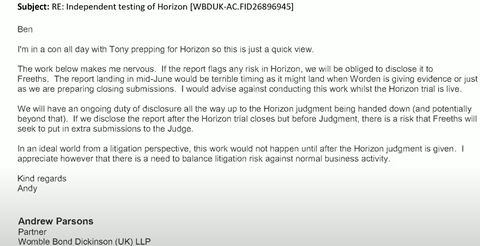
10.20am: The inquiry returns and we start with the fears among the legal team that litigation defeats were reflecting badly on the department.
When the recusal application appeal was refused, Foat wrote to external advisers Womble Bond Dickinson. He said: ‘We will need to explain [to] the CEO and the board why we received advice that is again contrary to the outcome… I am concerned that credibility is being lost.’
10.05am: Following the instruction of Herbert Smith, Foat recalls that MacLeod 'felt redundant' - and indeed she was removed soon after. Foat replaced her. Blake asks if he felt he had sufficient experience to take on such a post. Foat says he had plenty of legal experience in private and in-house practice, but accepts the point that the Post Office was his first general counsel job.
And with that, we go to a break.
10am: The inquiry looks at the fallout from the group litigation and in particular the removal of Jane MacLeod as general counsel. MacLeod wrote this memo to herself recounting the outcome of a meeting with the chief financial officer Alisdair Cameron. He had warned her that his words 'will make you angry' and outlined how Herbert Smith (HS) was going to be immediately instructed to advise.
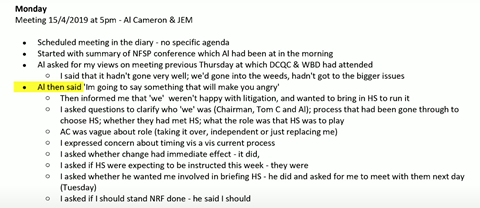
9.55am: Foat is asked about the decision to apply for Mr Justice Fraser, who gave the Bates judgment, to be recused. Foat says he was not involved in that decision, but recalls that he expressed surprise when he was told it was happening. He had told MacLeod there would be a 'high bar' to having the judge removed but was assured it was legally sound.
9.50am: Foat says he offered twice to MacLeod to help with the group litigation but she insisted that was not necessary.
Blake suggests Foat became more involved with the group litigation in 2018 and that at the very least he was sitting on the sidelines watching proceedings.
Foat seeks to distance himself from the handling of the group litigation (now known as the Bates case), telling the inquiry he was not involved in instructing any external lawyers, did not sit on the lawyers' working group and did not attend the board subcommittee dealing with the litigation.
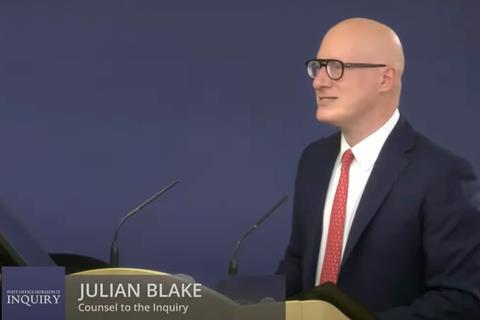
9.35am: Inquiry sees internal email from Williams to colleagues, where he urges them to consider that any documents they create may have to be disclosed (see below). Blake asks whether Post Office colleagues had a tendency to mark documents as legal privileged even when they were not.
'As a general point I could imagine that is the case,' says Foat.
Blake asks whether he was aware that there was a focus in Post Office not to write things down so they could not be disclosed at a later point. Foat, who was legal director at the time, says he was not.
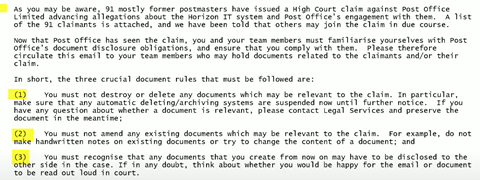
9.25am: Foat is shown a report from 2015 (before he joined) which raised issues with the Horizon system. He confirms this was never flagged up by in-house solicitor Rodric Williams (pictured below) when he joined.
Blake asks: 'What is your view of Mr Williams' competence and credibility?'
Foat replies: 'I found him to be a very diligent and passionate lawyer. I didn't have issues around his technical competence - in fact I found his technical competence to be sound.'
And now, asks Blake.
Foat: 'I understand that Mr Williams has identified there were areas that were missed and of course with that in mind any lawyer would be incredibly mindful of missing such pertinent information.'
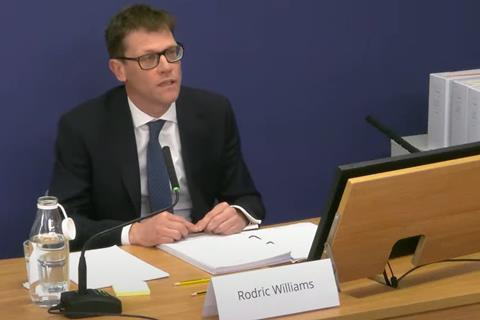
9.20am: Inquiry is looking at an internal email chain from 2017 involving discussions with the legal team. Chief financial officer Alisdair Cameron had raised the issue of what to do about cases based on Horizon data. He recommended bringing in chief executive Paula Vennells because the issue was 'now costing us blood'. Then general counsel Jane MacLeod replied to say that they should wait to find out the outcome of a review by Deloitte.
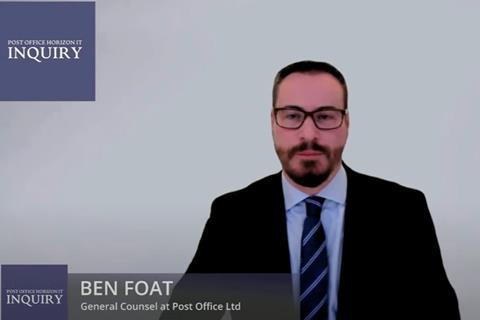
9.10am: Julian Blake is asking the questions on behalf of the inquiry. He begins by looking at Foat's career. He was a solicitor with various firms in Australia before he joined the Post Office in 2015. He became legal director in 2016 and general counsel in 2019. He has been on a leave of absence since April.
Foat says that when he joined the organisation he heard from several colleagues that the Horizon system was like an air traffic control system because it was so robust.
9am: A brief moment of delay while they iron out some gremlins with the video link. In the meantime, you can read our preview of Foat's evidence here: Post Office Inquiry: Five key questions for Post Office's top lawyer Ben Foat to answer.
